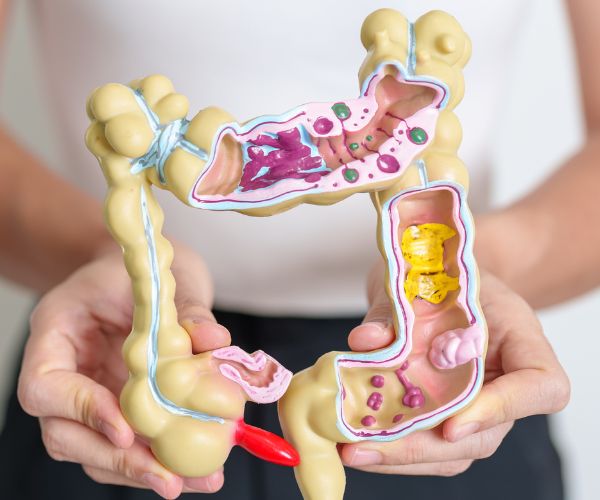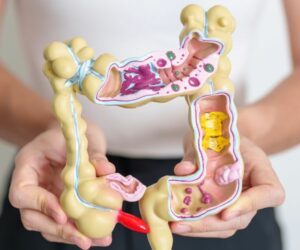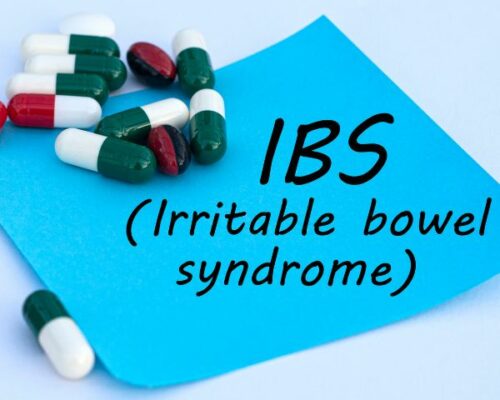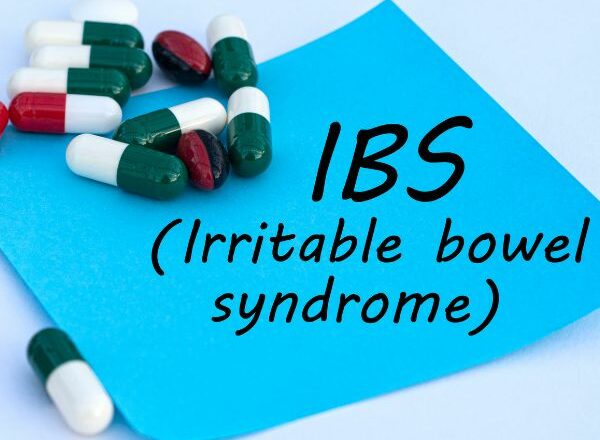What is mucus colitis and how do you treat it?
Learn more about this condition nd how it may be treated.
What is mucus colitis and how do you treat it?
Learn more about this condition and how it may e treated.

Mucus colitis, or IBS, is a condition that impacts the large intestine, or colon. Unlike inflammatory bowel diseases (IBD) like Crohn’s disease or ulcerative colitis, IBS does not cause changes in bowel tissue or increase the risk of colorectal cancer.
However, it is a functional disorder, meaning the digestive system looks normal but does not function properly. It is marked by a heightened sensitivity of the intestines to certain stimuli, leading to irregular bowel movements and an increased secretion of mucus.
IBS is often classified into three subtypes based on predominant symptoms:
- IBS with constipation (IBS-C): Predominantly hard or lumpy stools
- IBS with diarrhoea (IBS-D): Predominantly loose or watery stools
- IBS with mixed bowel habits (IBS-M): Alternating between constipation and diarrhoea
IBS typically affects people between the ages of 20 and 40, with women being more likely to develop the condition than men.
Mucus colitis, or IBS, is a condition that impacts the large intestine, or colon. Unlike inflammatory bowel diseases (IBD) like Crohn’s disease or ulcerative colitis, IBS does not cause changes in bowel tissue or increase the risk of colorectal cancer.
However, it is a functional disorder, meaning the digestive system looks normal but does not function properly. It is marked by a heightened sensitivity of the intestines to certain stimuli, leading to irregular bowel movements and an increased secretion of mucus.
IBS is often classified into three subtypes based on predominant symptoms:
- IBS with constipation (IBS-C): Predominantly hard or lumpy stools
- IBS with diarrhoea (IBS-D): Predominantly loose or watery stools
- IBS with mixed bowel habits (IBS-M): Alternating between constipation and diarrhoea
IBS typically affects people between the ages of 20 and 40, with women being more likely to develop the condition than men.

Symptoms of IBS
The symptoms of IBS can vary from person to person but usually include:
- Abdominal pain or cramping is often relieved by passing stool
- Bloating and gas
- Changes in bowel habits, such as constipation, diarrhoea, or both
- Presence of mucus in the stool, which can range from small amounts to large quantities
- A sensation of incomplete evacuation after defecation
These symptoms can be intermittent and may fluctuate in severity. Emotional stress, certain foods, and hormonal changes (particularly in women) can exacerbate symptoms. Also, these symptoms may not always be a sign of IBS, so make sure to speak to a medical professional.

Symptoms of IBS
The symptoms of IBS can vary from person to person but usually include:
- Abdominal pain or cramping is often relieved by passing stool
- Bloating and gas
- Changes in bowel habits, such as constipation, diarrhoea, or both
- Presence of mucus in the stool, which can range from small amounts to large quantities
- A sensation of incomplete evacuation after defecation
These symptoms can be intermittent and may fluctuate in severity. Emotional stress, certain foods, and hormonal changes (particularly in women) can exacerbate symptoms. Also, these symptoms may not always be a sign of IBS, so make sure to speak to a medical professional.

Causes of IBS
The exact cause of IBS remains unclear, but several factors are believed to contribute to its development:
Abnormalities in gut-brain interaction
The gut has a complex nervous system known as the enteric nervous system, which communicates with the brain
Gut motility issues
People with mucus colitis may experience irregular muscle contractions in the intestines, causing spasms, which can result in diarrhoea
Increased gut sensitivity
Individuals with IBS tend to have a heightened pain response to normal intestinal activity due to increased sensitivity in the gut
Inflammation and infection
Research suggests that low-grade inflammation or a previous infection can trigger the onset of mucus colitis in certain people
Microbiome imbalance
An imbalance in the gut microbiota (the community of microorganisms living in the intestines) may contribute to the symptoms of IBS
Genetics
There is evidence that Irritable Bowel Syndrome can run in families, indicating a potential genetic component. This may not apply to everyone
Treatment options for IBS
While there is no cure for IBS, there are several treatment options available to help manage symptoms. Treatment plans are often individualised, depending on the type of IBS, symptom severity, and patient preferences. Here are some of the most commonly recommended treatments:
Dietary modifications
Diet plays a crucial role in managing mucus colitis. Common dietary strategies include:
Low FODMAP diet
This diet involves reducing the intake of fermentable oligosaccharides, disaccharides, monosaccharides, and polyols (FODMAPs), which are types of carbohydrates that can trigger IBS symptoms
Fibre management
Increasing soluble fibre intake (found in foods like oats, fruits, and vegetables) can help alleviate constipation in IBS-C. However, insoluble fibre may worsen symptoms in some people
Avoiding trigger foods
Certain foods, such as caffeine, alcohol and fatty foods, may aggravate symptoms. An elimination diet, guided by a healthcare provider or dietitian, can help identify trigger foods
Medications
Depending on the type and severity of IBS, varios medications may be prescribed:
Antispasmodics
Medications like hyoscine and peppermint oil can help relieve abdominal cramping by reducing muscle spasms in the gut
Probiotics
Some studies suggest that probiotics may help balance gut bacteria and alleviate symptoms, but more research is needed
Antidepressants
Low doses of tricyclic antidepressants may potentially help reduce pain and improve bowel habits in some individuals
Psychological therapies
Given the connection between the brain and the gut, psychological therapies can be effective in managing IBS. These include:
Cognitive Behavioral Therapy (CBT)
CBT helps patients identify and modify negative thought patterns that can exacerbate symptoms
Gut-directed hypnotherapy
Hypnotherapy specifically targeting gut function has been shown to reduce symptoms in some individuals
Mindfulness and stress reduction
Techniques such as mindfulness meditation can help manage stress, a known trigger for IBS symptoms
Lifestyle changes
Incorporating certain lifestyle modifications can also help manage IBS:
Regular exercise
Physical activity can improve bowel motility, reduce stress, and enhance overall well-being
Hydration
Drinking lots of water can help prevent constipation, especially in people who eat more fibres
Sleep management
Good sleep hygiene can help reduce stress levels and improve gastrointestinal symptoms
These treatments may not work for everyone, so make sure to speak to a gastrointestinal specialist before attempting any of them.
Speak to a medical professional about IBS
If you start to notice the typical symptoms of IBS, such as yellow mucus in stool, you should consider speaking to a medical professional immediately. They can help you find the cause of your symptoms and help you manage your condition in a way that suits your unique medical needs.

Speak to a medical professional about IBS
If you start to notice the typical symptoms of IBS, such as yellow mucus in stool, you should consider speaking to a medical professional immediately. They can help you find the cause of your symptoms and help you manage your condition in a way that suits your unique medical needs.
Keep yourself healthy every day—visit your nearest gut clinic to find the best possible solution for your medical needs.

FAQs
Can IBS be cured?
No, there is no cure for this medical condition, but it can be managed.
Is IBS a life-threatening condition?
IBS is not life-threatening, and it does not cause permanent damage to the intestines or lead to more serious conditions like cancer. However, it can significantly impact a person’s quality of life due to its chronic symptoms, which require ongoing management.
For how long can a person have IBS?
A person can have IBS for many years, often for life, as it is a chronic condition with symptoms that can come and go over time.
